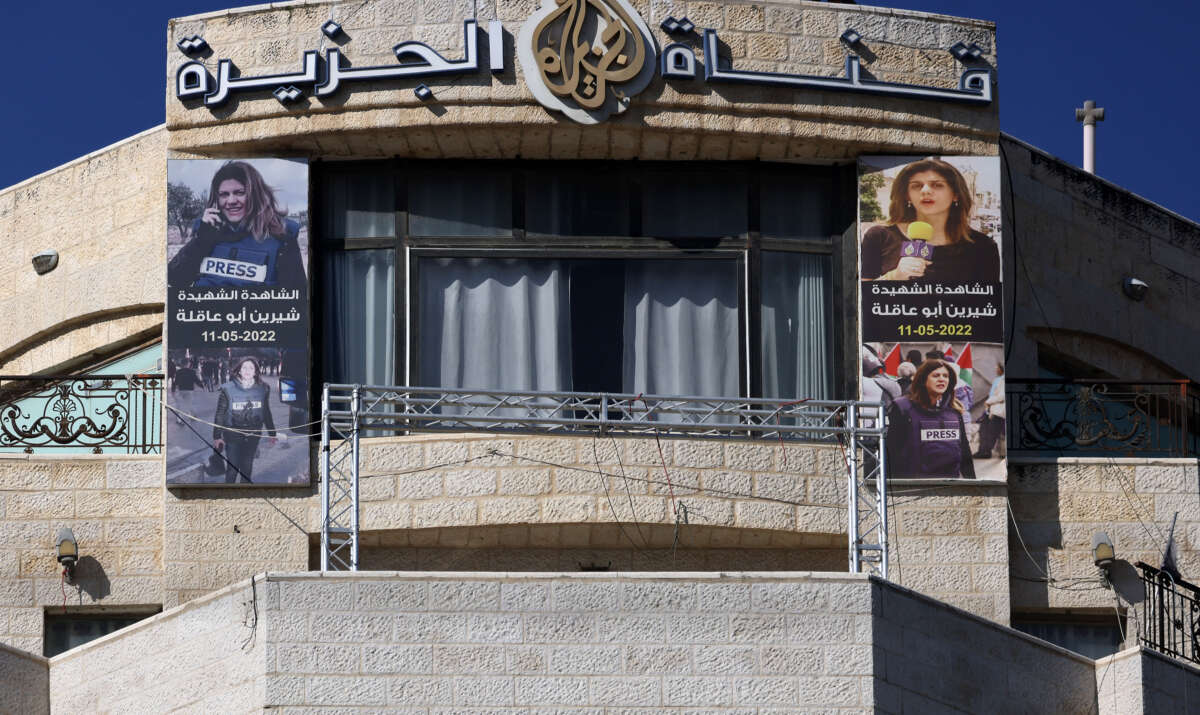The Qatar-based media network Al Jazeera issued a strongly worded statement Thursday deploring the decision by the Palestinian Authority to temporarily ban the outlet’s operations in the West Bank.
The network wrote that “Al Jazeera is shocked by this decision,” which it called “nothing but an attempt to dissuade the channel from covering the rapidly escalating events taking place in the occupied territories.”
The official Palestinian news agency — WAFA — wrote that the Palestinian Authority made the decision, which was handed down on Wednesday, because of Al Jazeera’s “repeated violations of Palestinian laws and regulations.” Al Jazeera has been accused of “broadcasting inciteful content” and “interfering in internal Palestinian affairs,” but the statement from WAFA didn’t offer a further explanation of how the network had broken the law.
The suspension will remain in effect until the network “addresses its legal status in accordance with Palestinian regulations,” per WAFA.
The Palestinian Authority has governing authority over parts of the Israeli-occupied West Bank, including cities like Jenin and Ramallah. The Palestinian Authority is viewed with suspicion by many Palestinian people because of its security coordination with Israel.
In December, forces with the Palestinian Authority stormed the Jenin refugee camp and began a crackdown on armed groups in the camp, which has long been a site of armed struggle and resistance to Israel. Al Jazeera covered the operation.
In Jenin, a young woman who — according to Democracy Now! — had been active in “documenting the Palestinian Authority’s crackdown on armed groups fighting the Israeli occupation,” was shot dead this past weekend. The family of the young reporter, Shatha al-Sabbagh, says that the Palestinian Authority security forces are responsible for her death.
A spokesperson from the Palestinian Authority denied this accusation during an interview with Al Jazeera on Sunday.
“The decision to freeze Al Jazeera’s work and prevent its journalists from conducting their duties is an attempt to hide the truth about events in the occupied territories, especially what is happening in Jenin and its camps,” Al Jazeera wrote in their statement. The network added that the move aligns “with the previous action taken by the Israeli government, which closed Al Jazeera’s office in Ramallah.”
In May 2024, Israel shuttered Al Jazeera’s operations within Israel on security grounds, and a couple months later raided the network’s office in Ramallah.
Officials in Israel have long accused Al Jazeera — one of the most prominent media outlets in the Arab world — of being a “mouthpiece” for Hamas, according to The New York Times.
Angry, shocked, overwhelmed? Take action: Support independent media.
We’ve borne witness to a chaotic first few months in Trump’s presidency.
Over the last months, each executive order has delivered shock and bewilderment — a core part of a strategy to make the right-wing turn feel inevitable and overwhelming. But, as organizer Sandra Avalos implored us to remember in Truthout last November, “Together, we are more powerful than Trump.”
Indeed, the Trump administration is pushing through executive orders, but — as we’ve reported at Truthout — many are in legal limbo and face court challenges from unions and civil rights groups. Efforts to quash anti-racist teaching and DEI programs are stalled by education faculty, staff, and students refusing to comply. And communities across the country are coming together to raise the alarm on ICE raids, inform neighbors of their civil rights, and protect each other in moving shows of solidarity.
It will be a long fight ahead. And as nonprofit movement media, Truthout plans to be there documenting and uplifting resistance.
As we undertake this life-sustaining work, we appeal for your support. We have 10 days left in our fundraiser: Please, if you find value in what we do, join our community of sustainers by making a monthly or one-time gift.
